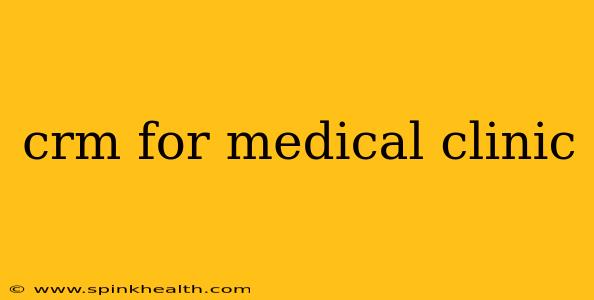The relentless pace of a medical clinic demands efficiency. Juggling appointments, patient records, billing, and communication can feel like a never-ending juggling act. This is where a Customer Relationship Management (CRM) system steps in, transforming chaos into controlled efficiency. But with so many options available, choosing the right CRM for your medical clinic can feel overwhelming. This isn't just about managing contacts; it's about enhancing patient care, improving team collaboration, and ultimately, boosting your clinic's bottom line.
Let's embark on a journey to find the perfect CRM fit for your unique needs. Imagine a world where patient information is readily accessible, appointments are seamlessly scheduled, and communication flows smoothly – this isn't a dream, it's a reality achievable with the right CRM.
What are the key features of a good medical clinic CRM?
A top-notch medical CRM isn't just a contact list; it's a comprehensive system designed to handle the specific demands of healthcare. It should seamlessly integrate patient data, streamline appointment scheduling, simplify billing processes, and facilitate efficient communication. Think of it as the central nervous system of your clinic, connecting all aspects of your operation. Key features to look for include:
- Secure Patient Data Management: HIPAA compliance is paramount. Your CRM must guarantee the security and privacy of sensitive patient information.
- Appointment Scheduling: A robust scheduling system that minimizes conflicts and maximizes clinic capacity. Online booking capabilities are a huge plus.
- Electronic Health Records (EHR) Integration: Seamless integration with your EHR system is critical for a streamlined workflow.
- Billing and Insurance Management: Efficient tools to manage billing, claims, and insurance reimbursements.
- Communication Tools: Secure messaging, automated appointment reminders, and patient portals for easy communication.
- Reporting and Analytics: Track key metrics like appointment cancellations, patient demographics, and revenue to make data-driven decisions.
How does a CRM improve patient care?
The benefits of a CRM extend far beyond administrative efficiency. By streamlining processes and improving communication, a CRM directly enhances patient care. Imagine:
- Reduced Wait Times: Efficient scheduling and appointment reminders lead to fewer missed appointments and smoother workflows, resulting in less wait time for patients.
- Improved Communication: Easy access to patient history and secure messaging allows for better communication and personalized care.
- Personalized Care: By having a holistic view of each patient's history, your staff can provide more tailored and effective treatment plans.
- Enhanced Patient Experience: A smoother, more efficient process translates to a more positive overall experience for patients.
What are the different types of CRMs for medical clinics?
There's a wide spectrum of CRMs, catering to various clinic sizes and needs. Some are tailored specifically for medical practices, while others offer customizable options. Consider these categories:
- Cloud-Based CRMs: These offer flexibility and accessibility, often with subscription-based pricing models. They're ideal for smaller clinics that might not have dedicated IT staff.
- On-Premise CRMs: These are installed directly onto your clinic's servers. They offer greater control but require more investment in IT infrastructure.
- Specialized Medical CRMs: These are designed with the unique needs of medical practices in mind, often incorporating EHR integration and HIPAA compliance features.
How much does a medical clinic CRM cost?
The cost of a CRM varies greatly depending on the features, scalability, and provider. Pricing models can range from affordable monthly subscriptions for smaller clinics to more substantial investments for larger practices with complex requirements. It's essential to carefully evaluate your needs and budget before making a decision. Many providers offer free trials or demos, allowing you to test the software before committing.
What are some of the best CRM software options for medical clinics?
Numerous CRM solutions cater to medical clinics. Research is key to find the ideal fit for your specific needs and budget. Consider factors like:
- Ease of Use: How intuitive is the system for your staff?
- Integration Capabilities: Does it integrate with your existing EHR system and other essential tools?
- Scalability: Can the system adapt to your clinic's growth?
- Customer Support: What level of support is offered by the vendor?
Choosing the right CRM is a significant step toward optimizing your medical clinic's performance and enhancing patient care. It's an investment that will pay dividends in efficiency, improved communication, and ultimately, a more satisfied patient base. By carefully considering your needs and exploring various options, you can find the perfect partner to help your clinic thrive.

